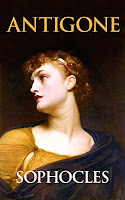For one thing, the opening paragraph (called "The Argument") gives an overview of the story's principal events so you never have to wonder what is going on. Then comes a brief list of characters (the last two books I read would have been so much easier to understand if I'd had that!) After that, the reader plunges right in. I admit that having some background in Shakespearean English (or at least in the King James Bible) would be helpful in understanding the old-fashioned language. Once I got the hang of it, I loved the plucky heroine, the great dialogue, and the gorgeous wording.
The basic story is of a young woman who goes against the king's arbitrary command (to leave her dead brother unburied) and the heavy price everyone pays for it. Many universal themes are introduced, but the main one is civil disobedience. When does loyalty to family override loyalty to government? Antigone argues that the gods would not have approved of the king's edict. So, she is not only being loyal to her brother, but also to a higher Law. She says to King Creon:
Nor did I deem that thou, a mortal man,
Could'st by a breath annul and override
The immutable unwritten laws of Heaven.
They were not born today nor yesterday;
They die not; and none knoweth whence they sprang.
It was startling apropos to our present times as the government continues to encroach on personal religious beliefs.
My translation (free via Hoopla) by Francis Storr was stunning in its beauty. Here are a few favorite quotes:
Much thought extends a furlong into a league. (Which I loosely interpret to mean, "Overthinking turns an inch into a mile.")
Hope flits about on never-wearying wings. (Do you suppose this line could have inspired Emily Dickinson's famous poem?)
I would not weigh his wealth and power against a dram of joy.
Ironic statement from a position of power:
Now if she thus can flout authority unpunished,
I am woman, she the man.
On Pride: To err is common
To all men, but the man who having erred
Hugs not his errors, but repents and seeks
The cure, is not a wastrel nor unwise.
No fool, the saying goes, like an obstinate fool.
Word lovers will revel in phrases like, "her brother lay unsepulchered." And the word "snaffle" made me laugh with delight (even though it's only an old-fashioned word for bridle.) Oh, if only I could slip this delightful phrase into a future conversation: "You vex me with your babblement."
A quick, but worthwhile read. I listened, and then loved it so much downloaded a copy to read again the next day.
Blessings,





